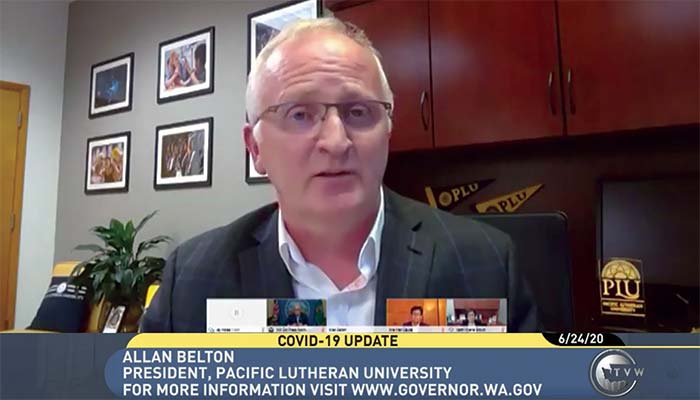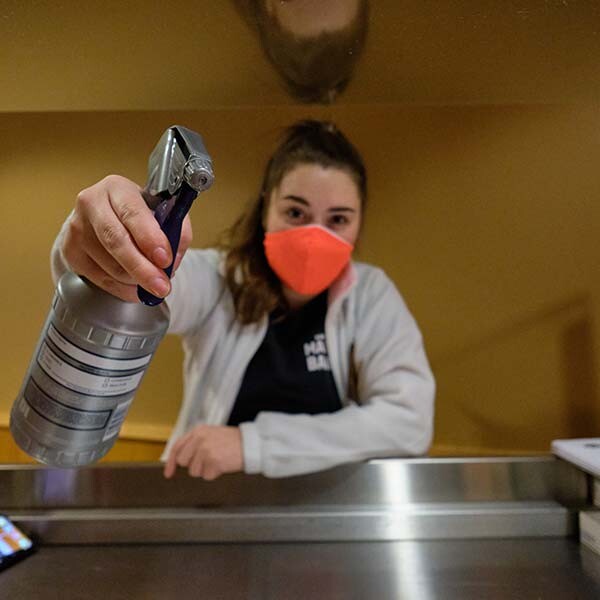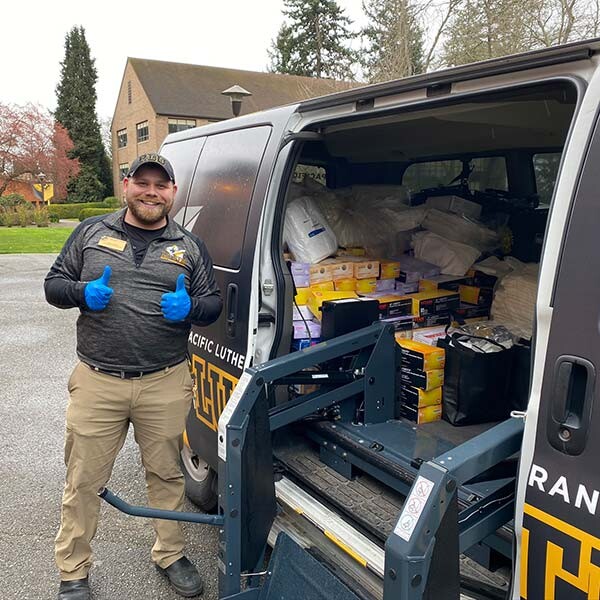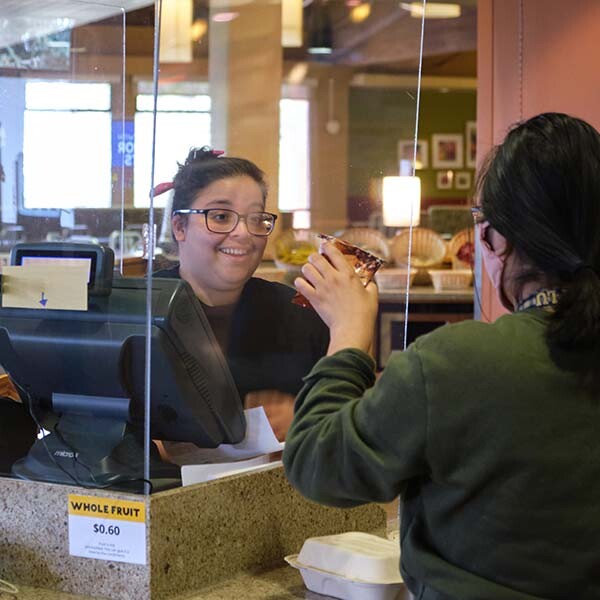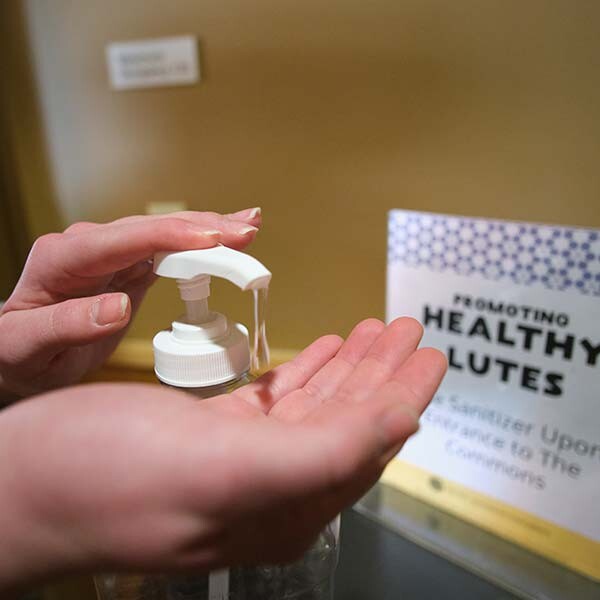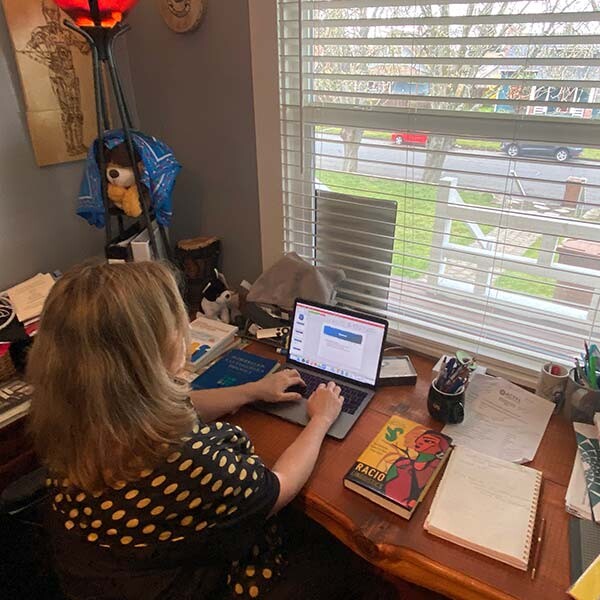
Roughly eight months ago the first case of Novel Coronavirus in the United States was confirmed 60 miles north of the PLU campus. University officials had already been tracking the virus, and, after it arrived stateside, PLU was one of the first higher education institutions in the country to activate its incident command center.
At that point it was apparent that the virus would have an immediate and profound effect on the living and working experience of every student, staff member, and faculty member. Questions poured in by the dozen from every corner of campus. Will classes be cancelled? Are there still going to be athletic and performing arts events? How will the university keep students studying abroad safe?
Co-led by Vice President for Student Life Joanna Royce-Davis and Clinical Director of Counseling, Health and Wellness Services Elizabeth Hopper, incident command sprang into action, utilizing existing emergency management policies when applicable, and writing new ones unique to challenges posed by the emerging pandemic.
“Some of the organizational schema was really helpful, but in some ways it wasn’t specialized enough for response to this particular emergency,” says Royce-Davis. “For example, our emergency protocol does not have a cleaning committee, but a cleaning committee was absolutely necessary for response to this.”
A cleaning committee was just the start of what quickly became an all-hands-on-deck effort. Incident command began meeting daily, often twice daily, and added staff members to represent additional offices and departments.
Command leadership quickly established that decisions would be informed by the best information available from a standard set of references anchored by the World Health Organization, the Centers for Disease Control and Prevention, and local agencies like the Tacoma-Pierce County Health Department.
For about a month, incident command monitored the situation across the state, kept in daily contact with the county health department, and oversaw preventative measures like frequent high-touch surface cleaning and installing hand sanitizer stations throughout campus.
“Especially because Washington was the initial national epicenter, early on we were spending a lot of time analyzing the evolving research and information to determine how it might affect us on campus in the days ahead,” remembers Hopper. “In those early weeks it was a bit of a waiting game, but we pretty quickly got to the point of needing to lock down parts of campus, and much of our work became figuring out the best approaches to doing that.”
“It was important that we were calm, together and thinking critically and clearly about what we could really know and being clear about the decision-making process, and how decisions would impact students, faculty and staff,” remembers PLU President Allan Belton.
“There were probably 90 straight days last spring where a group of us were digging deep into the information and working toward making tough decisions.”
PIVOTING TO DISTANCE LEARNING
By early March, it became evident that in-person learning simply could not be done safely. “We just weren’t going to take any chances with people’s health and safety,” says Belton. “By that point, though it was a disappointing decision, it was not a difficult decision. It was just what needed to be done.”
The announcement that all regular classes would transition to distance learning was shared with the campus community via email on March 7. Students and faculty turned on a dime from in-person to largely online-based learning. Again, the questions poured in, this time from students to their professors. How will I complete my biology lab experiment? Will we still be presenting our capstone projects? Should I continue in my student-teaching role at a local elementary school?
Faculty members poured themselves into the work of supporting students and supporting each other. Led by the more than 75 professors who had been trained through the university’s PLUTO (PLU Teaching Online) institute, faculty members who were steeped in online teaching provided counsel to their peers.
“I appreciate how my colleagues have all come together to support each other during these times,” said Professor of Hispanic Studies Bridget Yaden in late March. “We’ve had department meetings via Zoom where we’ve been open and honest about the challenges, where we’ve shared teaching ideas, and where we’ve just been there to listen to each other.”
850+
Donors have donated $283,662 and counting to the PLU Student Emergency Fund. These funds are being used to support students experiencing unexpected financial hardship related to the COVID-19 pandemic. This effort is still ongoing and we'd love your help.
“Even for those of us comfortable with technology, the transition to a distance learning approach has been challenging, especially given the quick timeline for the change,” Yaden continued. “I encourage my colleagues to think of what works best for your teaching style and your students’ learning, and see how that can be adapted to distance learning.”
“In these most unprecedented and uncertain of times, our faculty are stepping up,” Provost Joanna Gregson shared via Facebook video on April 21. “They’re advocating for students, they’re extending deadlines, they’re moving assignments around to acknowledge the space students are in, and above all, they are teaching well. They are stepping up, because above all they value excellence in teaching.”
CARING FOR STUDENTS
In short order, upcoming concerts, athletic competitions, guest lectures and on-campus gatherings were cancelled.
The vast majority of PLU’s residential students opted to move off campus to complete the semester. Around 250 remained who felt that PLU was the safest place for them to complete the semester. Residence halls, dining services, the campus health center, and other essential student services remained open to meet the needs of the residential community.
“Our priority was ensuring that we would do our best by those students and to keep them safe and well,” says Royce-Davis. “We spent a lot of time thinking through how to safely provide meals and how to continue to safely provide some elements of community in the residence halls, even as that became more restrictive. We were also concerned about access to library resources and technology, and mental health resources.”
JEN RUDE AND MATT NELSON
By the end of March, the Student Care Network, a coalition of staff and students led by University Pastor Jen Rude and former Assistant Dean of Students Matt Nelson, launched a number of online initiatives to help keep students on and off campus connected. Among the efforts was “CheckFive,” a campaign that encouraged Lutes to reach out to five people and check in, specifically those who had seemed to go quiet during the pivot to distance learning
“CheckFive is about connecting and starting a conversation with a peer you miss seeing around campus,” said Lace Smith, associate vice president for Marketing and Communications. “Human interaction has never been more important — and someone out there might really need that phone call, text, email or social media message.”
“It was important that we were calm, together and thinking critically and clearly about what we could really know and being clear about the decision-making process, and how decisions would impact students, faculty and staff.”
For many, a major disappointment of the COVID spring was the inability to celebrate high school and college graduating classes at traditional spring commencement ceremonies. At PLU, students voted overwhelmingly in favor of postponing the in-person commencement ceremony to a later date over holding a virtual ceremony on the originally planned spring date.
To celebrate and support PLU’s Class of 2020, staff again had to innovate. Marketing and Communications created a suite of social digital tools, videos and resources graduates and their families could use to celebrate on social media. Alumni and Student Connections hosted an extensive series of online events to support graduates beginning their job searches. And on the day that commencement would have been held, 160 staff and faculty members called more than 800 undergraduate and graduate students with messages of congratulations and encouragement.
PLANNING FOR FALL SEMESTER
As soon as spring semester ended, staff and faculty began preparing for the fall. The incident command team that led the university through the spring gave way to an executive-staffed recovery planning team and working groups dedicated to academic affairs, student life, and administrative services.
“Our plan, based on modeling and indications from public-health agencies, is that we will return to in-person learning for the fall term with the appropriate and necessary health and safety measures in place,” Belton wrote to the campus community in late April.
“Of course, a successful return to campus life and the ability to maintain in-person learning remains highly dependent on the availability of testing and contact tracing, and on our ability to adapt in real time to potential increases in new cases or new public-health directives,” he continued in the same email.
By mid-June, the recovery planning team distributed “Return to Work” and “Return to Learning” guidebooks to students, staff and faculty members detailing the university’s plans for the fall. A week later, Washington Gov. Jay Inslee issued a proclamation permitting universities in Washington that adhere to an extensive list of mitigating requirements to return to in-person instruction in August.
Throughout June and July, staff and faculty finalized protocols and procedures to ensure that when students return to classrooms, library, residence halls and dining facilities, not only are they as safe as possible, but that they enjoy a living and learning experience that meets the university’s high standards.
“We’re not leaving any possible scenarios undiscussed,” says Chief Operating Officer Teri Phillips. “There is a large contingent of staff from all over campus for whom planning for COVID recovery and management has been our top priority this summer.”
Among the measures being taken are the reimagining and reconfiguring of teaching spaces to decrease student density, creating innovative dining service plans to avoid crowding campus restaurants, temporarily loosening restrictions that first- and second-year students whose permanent residence is beyond 25 miles of campus must live on campus, and ensuring that fewer residential students are sharing living space with a roommate.
Come fall, the university will outfit every member of the campus community with quality face coverings, provide no-cost COVID-19 testing for students, set aside reserved residence hall rooms for possible self-isolation, and be set to work with the Tacoma–Pierce County Health Department on contact tracing for potential positive tests.
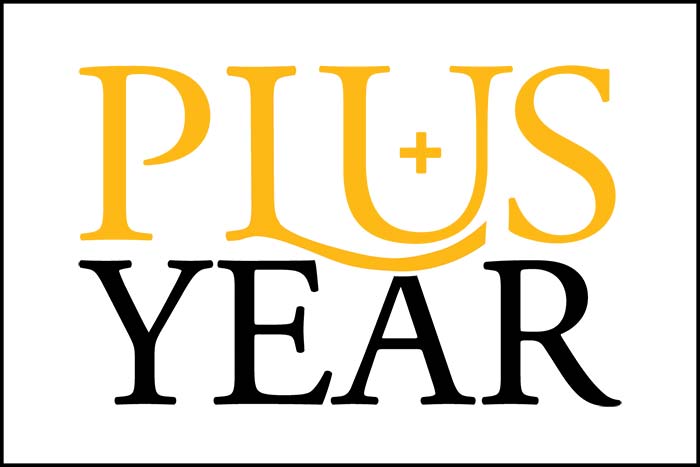
In August, PLU announced plans to offer an additional tuition-free year to all undergraduate students enrolled full time for the 20-21 academic year. Dubbed a supplemental “PLUS Year” by the university, the two additional semesters will be offered to students directly after their currently scheduled degree completion date. Graduate students will be offered opportunities for tuition-free continuing education courses. The announcement was praised for its innovation and covered by local, regional and national news outlets.
“With each new day PLU staff and faculty members spend planning for fall semester, the different likely scenarios become slightly more clear to us,” Belton wrote in a June editorial in The News Tribune. “It’s no exaggeration to say that a reopening of campus will be the result of one of the most comprehensive plans ever created and executed in our institution’s 130-year history. Through it all, we will be guided by an unwavering commitment to well-being and safety.
“No matter the challenge — whether learning from a distance, learning while wearing face coverings, or living, learning, and working as alumni in our community — we remain true to an important aspect of our mission: to thoughtfully care for other people, our community and the Earth.”
Note to readers: the contents of this feature were finalized in July. It is possible that plans for Fall Semester have changed since this issue was sent to design and press.


